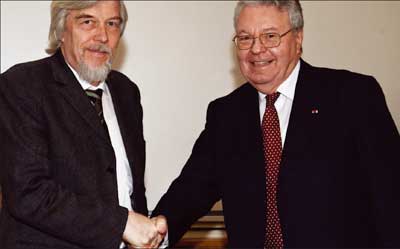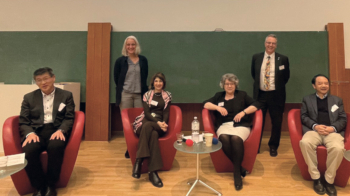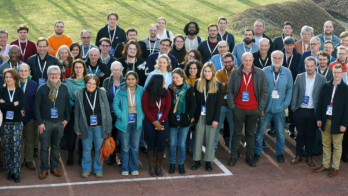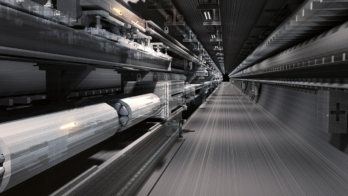
At its meeting on 12 December, CERN Council thanked the organization’s outgoing management and welcomed in the new. It was an occasion to take stock of the achievements of the past five years and to look forward to the next. Robert Aymar, the departing director-general, looked back on his five years at the helm, while his successor, Rolf Heuer, presented his vision for the future.
Aymar’s five-year mandate encompassed both CERN’s 50th anniversary and the first beams in the LHC. “It has been a privilege to lead this great organization for the last five years,” Aymar told Council. “My mandate started on a high note – the celebration of 50 years at the cutting edge of science and innovation – and it is also finishing on a positive. After a year of highs and lows, I am leaving CERN with a clear route to physics at the LHC in 2009.”
Council was also informed of the actions taken following the incident that brought LHC commissioning to a halt on 19 September (Mobilizing for the LHC). The scientific policy committee, an advisory body for Council, had an extensive session on this matter and reported its findings, endorsing the robust manner in which CERN is addressing the issue. “We have been impressed by the rapid and professional manner in which this situation has been mastered,” said Torsten Åkesson, president of Council, “and look forward to the LHC experiments collecting their first colliding-beam data in 2009.” Council’s confidence was underlined by its endorsement of the existing LHC project-management team until the machine is handed over for routine operation.
Presenting his ambition for the future, Heuer stressed that physics at the LHC would be the top priority in 2009. Looking farther ahead, he outlined his vision of a key role for CERN in an increasingly global basic-research environment. “CERN is a European lab hosting a global project,” he said. “The LHC project has evolved this way. In the future, however, we need to go further, working together with our partners around the world on the basic programme, with national projects, regional projects and global projects all serving a common goal. Now is the time for us to lay the foundations for such future programmes, which will be built on strong national and regional pillars in the Americas, Europe and Asia. In my view, CERN is Europe’s pillar.”
Following a period of study, Romania was formally accepted as a candidate for accession to membership of CERN. Its membership will be phased in over a five-year period during which the country’s contributions will ramp up to normal member-state levels in parallel with Romanian participation in CERN projects.
Setting a marker for the future, Council approved the creation of a study group to examine the geographical and scientific enlargement of CERN. This group will hold its first meetings in early 2009.
In its European strategy session, Council decided on the procedure to recognize and follow projects that are relevant to the European strategy for particle physics, including projects that are not necessarily based at CERN’s Geneva laboratory. Council followed these new procedures in recognizing four projects in the EU’s Seventh Framework Programme that are related to accelerator R&D and future facilities.





